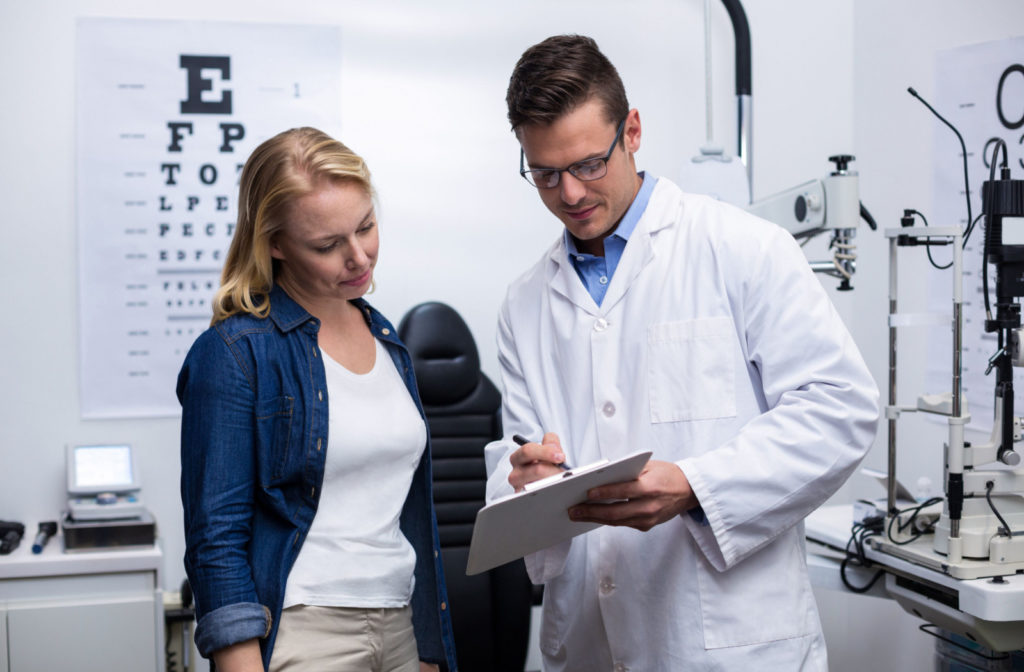Regular eye exams are the most effective way to maintain and improve your eye health. Eye exams improve your vision, prevent damage and disease, and provide an opportunity for your trusted optometrist to give expert treatment and advice about your eye health.
Knowing how long an eye exam will take can help you save time by allowing you to prepare. Have your insurance card and photo ID ready to speed up the check-in process. You should also bring a list of your family’s medical history and vision loss symptoms to discuss with your eye doctor.
On average, eye exams take about half an hour. But they can go quicker or need more time depending on your vision needs.
What Happens During a Regular Eye Exam?
Regular eye and vision exams are important parts of preventive healthcare. Many eye and vision issues progress without obvious symptoms or signs, so you may be unaware if you have a problem.
Early detection and treatment of eye and vision problems can prevent vision loss. The tests performed are based on each patient’s symptoms and your optometrist’s professional judgment.
A typical comprehensive eye exam includes:
- A health background check
- A visual acuity test
- Preliminary evaluations of vision and eye health, including colour vision, depth perception, peripheral vision, and pupil check
- A Refractive test to identify the presence of astigmatism, nearsightedness, or farsightedness
- An assessment of your eye focusing, eye teaming, and eye movement skills
Routine eye exams also include comprehensive testing for eye diseases like glaucoma, diabetic eye conditions, and cataracts. This is usually done using noninvasive diagnostic tools to check your internal and external eye structures.
Are Eye Exams Different If I Have Contacts?
A contact lens eye exam differs from a standard comprehensive eye exam in that it includes additional measurements that aid in determining the shape and size of the surface of your eye and your ideal contact lens type.
How Long Does an Eye Exam Take?
Eye examinations can last anywhere from 30 minutes to more than an hour, depending on the type of tests required by your optometrist. Age, family history, your own medical history, and any symptoms you have are all factors that influence the length of your eye care appointment.

What Can an Eye Exam Detect?
Along with identifying eye diseases like glaucoma and cataracts, eye exams can detect other health issues and common refractive errors. Refractive errors occur when the shape of your eye fails to correctly bend light, resulting in a blurred image. Myopia (nearsightedness), hyperopia (farsightedness), and astigmatism are the 3 main types of refractive errors.
Myopia
Myopia occurs when your eye doesn’t properly focus light on the retina. Light rays must pass through your cornea and lens to your retina for you to see clearly.
The retina then converts light into signals, which are then transmitted to the brain and converted into images.
Myopia occurs when the eye becomes elongated, making it difficult to see distant objects. Image formation happens in front of the retina due to this elongation.
Hyperopia
Hyperopia is another type of refractive error. Someone with hyperopia can see distant objects clearly but has blurry near vision.
Hyperopia occurs when the eye is shorter than normal, causing Image formation behind the retina, making nearby objects appear blurry.
Astigmatism
Astigmatism is an error in the eye curvature that causes blurry distance and close-up vision.
It occurs when the curves on the front surface of the eye or the lens inside the eye are misaligned or when the surface of the eye is egg-shaped rather than round.
Astigmatism is commonly present at birth and can occur with nearsightedness or farsightedness.
Underlying Health Issues
Beyond ensuring that your eyes are healthy, going to the optometrist for your yearly exam has many advantages.
Many people are surprised to learn that a thorough eye exam can reveal details about a person’s general health in addition to their vision. Numerous systemic conditions, including:
- Diabetes
- High blood pressure
- Glaucoma
- Heart Disease
These issues can be identified through a thorough examination of the lens, retina, and optic nerve, sometimes even before other symptoms surface.
If an eye exam indicates a potential health problem, your optometrist will advise you to seek additional testing from a specialist or your primary care provider.
Book an Eye Exam Today
Comprehensive eye exams and contact lens exams involve a series of tests to provide your optometrist with the most accurate picture of your eye and vision health. How long do eye exams last? A basic eye exam takes at least half an hour.
Contact lens exams can take longer because there are additional steps and tests required during the eye exam. In either case, now that you know what to expect at the appointment, you can better prepare for your next appointment.
Has it been a while since your last eye exam? Book yours at Aurora 2020 today to make sure your vision is at its best.



